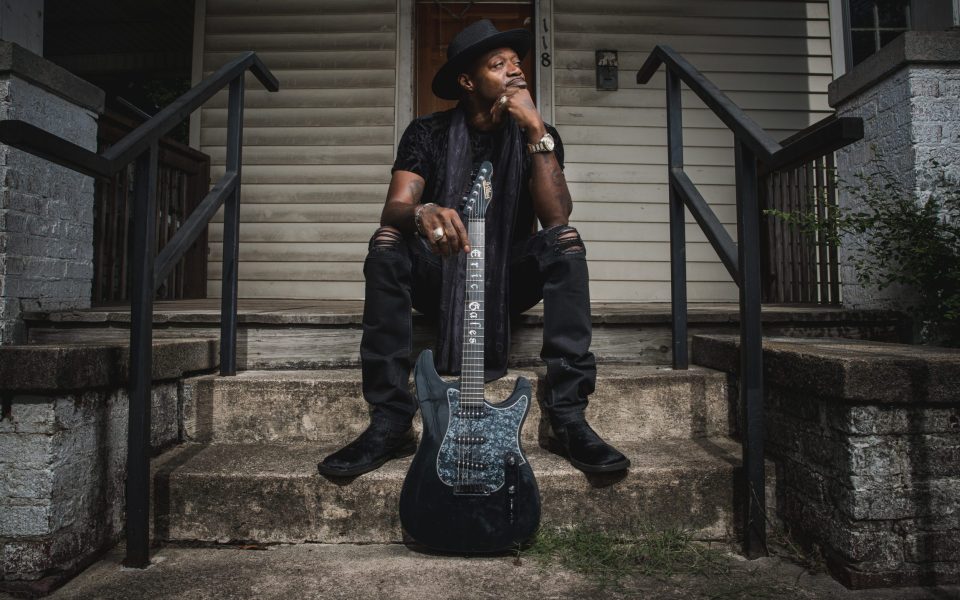Eric Gales plays the Coltrane Jazz Fest on Sunday
The guitar man Eric Gales swoops down Underhill Street in a gunmetal gray Mercedes touring van and glides into the parking lot at the intersection of Underhill and Washington streets in High Point.
Here, there’s an abandoned jump-rope hanging from the low power lines; vines have taken over some of the fine homes that housed the African-American moneyed class during Jim Crow. Others remain viable single-family units.
Gales, dressed in black and bling, eases from the van in the hot afternoon and walks down Underhill Street, pausing at No. 118 — hands on his slim hips, head tilted to take it in: two stories wrapped in vinyl siding, a boarded-up upper window, gravel under the sagging portico long treaded into the dirt.
“This is it, huh?” he asks. “This is wild.”
John Coltrane, one of the architects of modern jazz and High Point’s most famous son, lived in the house with his siblings, parents and grandparents until he was 17 years old, when he left for Philadelphia and international stardom, and never came back.
At first blush Gales, who headlines Sunday at the Coltrane Jazz Festival, might seem to have little in common with Coltrane: Gales is a blues-rock guitarist while ’Trane played transcendental sax. Coltrane worked in avant garde jazz circles while Gales drops No. 1 albums and plays arenas and cruise ships. Coltrane was from High Point and Gales lives in Greensboro.
The artist Gales gets compared with most is Jimi Hendrix.
“It’s how I hold the guitar, left-handed,” he says, “and I’m black. Boom. There’s no way to get around his legacy. And I don’t mind it. He’s a good one to be compared to.”
He didn’t even really know all that much about Coltrane before he booked the gig.
“I just knew he was a bad dude,” Gales says.
Gales came to the Coltrane Fest in 2015, in an unannounced sit-in with headliner Snarky Puppy that quickly became the talk of Triad live-music circles.
“How that happened,” he says, “I been friends with Snarky Puppy and they heard I lived in Greensboro. They were like, ‘Yo, bring your guitar.’ And I went out there and did my appearance and everybody was like, ‘Yo, who the fuck is that?’”
“And now here I am doing it again.”
In the ensuing years Gales’ star has risen. He just came off a blues cruise with guitarist Joe Bonamassa, prompting Bonamassa to tell Guitar magazine last week that Gales is “the best guitarist in blues-rock right now.”
Gales’ newest album, The Bookends, debuted at No. 1 on the Billboard blues chart in February. And later this year he was awarded Best Blues Rock Artist at the 2019 Blues Foundation awards.
And while Coltrane was revered as a genius in those small jazz circles, most of his fame came after his death at 40 years old, in 1967, of liver cancer.
Like a lot of jazz musicians of the day, Coltrane used alcohol and heroin habitually, vices that contributed to his death even 10 years after he gave them up. Gales understands that all too well.
He’s celebrating three years of sobriety — no booze, no drugs — after a wild youth that included addiction and jail time. No regrets. But he gets it.
“I don’t think the world understands,” he says. “When you are trusted with this miraculous gift, it comes with a lot of pressure. And we resort to certain vices that, in your mind, it’s helping you cope with all the
pressures of what you’ve been given.”
And for Coltrane, as a touring musician in the 1950s and ’60s, he says “just being black caused a lot of pressure. You’re on the road driving at night. You can’t stay in the same hotels with the white artists. Club managers won’t pay you your money. You’re dealing in the white world and you just want to perform.
“If he found pleasure in that vice,” Gales continues, “he probably weighed out the pros and the cons, and he took the cons.”
Now Eric Gales has his guitar out, the black one with his name etched on the fretboard, a black Calvin Klein scarf and a wide-brimmed black hat, and he’s posing in front of Coltrane’s childhood home. He knots the scarf around his neck.
“I could do this move that hides the chain,” he says, then unwraps the scarf and lets it hang, exposing the platinum treble clef that hangs below his chest. “Or I could do this one, boom, which I kind of like.”
As the photographer snaps away, an SUV pulls slowly down Underhill Street and stops in front of No. 118, the passenger window slowly descending. The driver calls out to Gales like they’re old friends.
“I saw you out here and I had to stop,” he says. “You playing Sunday?”
“I’m playing Sunday,” Gales confirms.
“Can I just say one thing?” the man asks.
Of course.
“Thank you,” he says to Eric Gales.
And the guitar man, standing in the shadow of the Coltrane House in this forgotten corner of High Point, pushes his hat to the back of his head, absorbing a visible chill.
“Thank you,” Gales says.
Here on Underhill Street, Eric Gales is home.
Join the First Amendment Society, a membership that goes directly to funding TCB‘s newsroom.
We believe that reporting can save the world.
The TCB First Amendment Society recognizes the vital role of a free, unfettered press with a bundling of local experiences designed to build community, and unique engagements with our newsroom that will help you understand, and shape, local journalism’s critical role in uplifting the people in our cities.
All revenue goes directly into the newsroom as reporters’ salaries and freelance commissions.


Leave a Reply